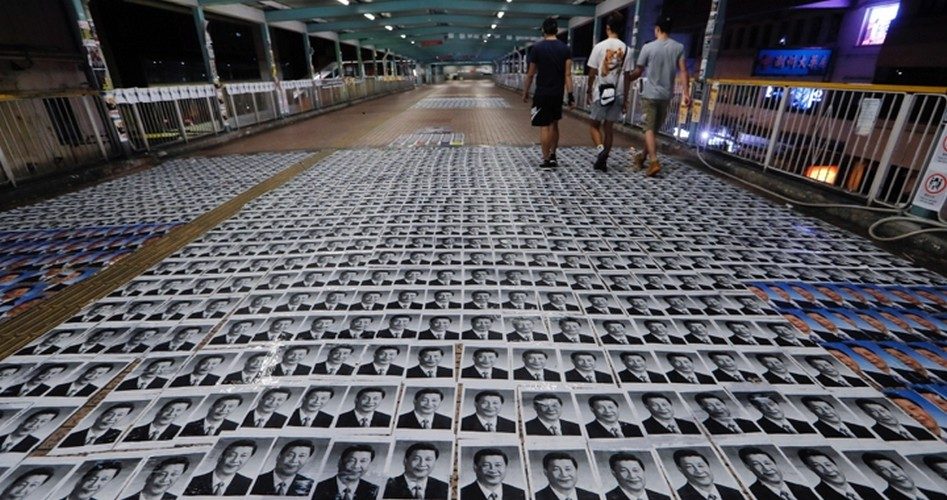
Podcast: Play in new window | Download ()
Subscribe: Android | RSS | More
Hundreds of thousands of people filled the streets of Hong Kong in protest against the Chinese Communist government this past weekend, with many protesters even stomping on printed images of Chinese Communist President Xi Jinping. Many compared the communist dictatorship to the National Socialist tyranny of Adolf Hitler.
Protests against the government in China have rocked Hong Kong for the past several weeks, after it was announced that some accused dissenters could be extradited to mainland China for trial.
Hong Kong was transferred to the control of Communist China in 1997, when a 99-year lease by the United Kingdom expired. Hong Kong was ceded to the British Empire as a colony at the conclusion of the First Opium War in 1842. In 1898, the British obtained a 99-year lease over the island. For the last 50 years of the lease, the British had essentially allowed Hong Kong an autonomous rule over the island. The British government under Margaret Thatcher offered to simply grant Hong Kong independent status in 1997, but the Chinese communists insisted on regaining Hong Kong for themselves. According to the agreement worked out at the time, Hong Kong holds a status as a special administrative region, with a separate system of governance and economic system (a free market as opposed to totalitarian communism on the mainland). This arrangement was termed “one country, two systems.”
As a separate entity from the communist mainland, Hong Kong boasts the most skyscrapers in the world per capita, as well as one of the highest per-capita incomes, and the longest life expectancy in the world. In short, Hong Kong exists as a powerful statement of the superiority of the free market over the command economy experienced in communist countries.
In recent years, as China has become increasingly totalitarian under Xi Jinping, the Chinese government has begun to increase its control over the island of 426 square miles and 7.4 million people.
Hong Kong has been the destination, over the years, of many refugees fleeing the totalitarianism of China. In 1949, communist forces led by Mao Tse-tung, won a civil war against the non-communist Kuomintang government led by Chiang Kai-shek. After Soviet forces entered China at the end of the Second World War, they turned over much of the war materiel of the defeated Japanese forces to Mao’s communists. That, plus the loss of support from the U.S. government, led to the defeat of the government of Chiang, which fled to the island of Formosa, where they established the Republic of China on Taiwan.
More than 10,000 Taiwanese have joined their neighbors is Hong Kong in sympathetic protest. Sixteen other additional nations had protesters take to the streets to march in support of the people of Hong Kong.
On Sunday, protesters clashed with Hong Kong police, with some police jumping on protesters and grinding their faces into the ground. Protesters struck back by using bricks and Molotov cocktails (home-made bombs). Some protesters have taken to calling the police attempting to enforce the rule of Communist China “Communist dogs.”
For their part, the Communist dictatorship in Beijing, and the governing authorities in Hong Kong have claimed that foreign “black hands” are giving support to the protesters.
A recent poll by the Chinese University of Hong Kong found that 69 percent of the citizens of Hong Kong place the blame for the rising tide of violence on the government, while only 12 percent put the blame on the protesters. Another 12 percent agreed with the Chinese Communists that unnamed foreigners are to blame.
Among the demands of the protesters are amnesty for arrested protesters, the granting of universal suffrage, and investigation of police violence.
Many people from older generations can remember 1989, when student protesters in Tiananmen Square in the Chinese capital city of Beijing, inspired by the fall of the Berlin Wall, were slaughtered by the Chinese military.
After a few years of relative relaxing of repression, the Chinese government has been cracking down on its own population — not just those in Hong Kong — in a way not seen since the nightmarish “Cultural Revolution” of Mao Tse-tung, perhaps history’s greatest mass murderer. Christian churches are facing increasing repression, as are Chinese Muslims, known as Uighurs, found in the northwestern province of Xinjiang. It is estimated that in excess of one million Muslims have been rounded up and herded into detention and forced “re-education” camps.
The comparison of the Chinese Communists to the National Socialists of Germany under Adolf Hitler is quite interesting, as today the Nazis are ordinarily placed on the right side of the political spectrum. But the reality is that a comparison with the ruthless rule in China and Hong Kong is quite appropriate, as “Nazi” was simply a pejorative for National Socialist, meaning that the Nazis were on left side of the political spectrum, which is where we find the communists.
This means that the greatest mass murderers of the 20th century were all socialists — Joseph Stalin in the Soviet Union, Mao Tse-tung in Red China, and Adolf Hitler in Germany.
Despite this reality, there are many in our own country who are looking with favor upon socialists such as Bernie Sanders, a man who took his honeymoon in the Soviet Union and has called for simply taking wealth away from some Americans.
Hopefully, as we sympathize with the protesters in Hong Kong, some Americans will understand that socialism’s logical end is what is going on in the streets of that prosperous former British colony.
Photo: AP Images
Steve Byas is a university history and government instructor and author of History’s Greatest Libels, a challenge to some of the greatest lies of history. He can be contacted at [email protected]


